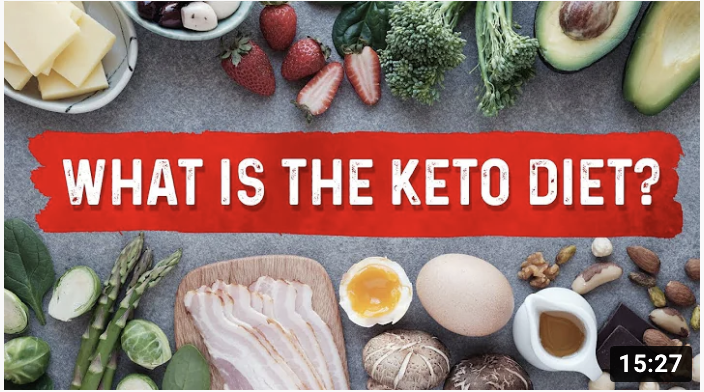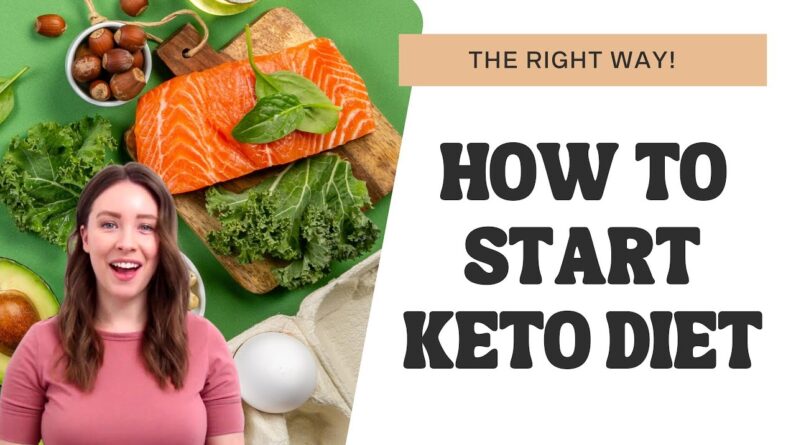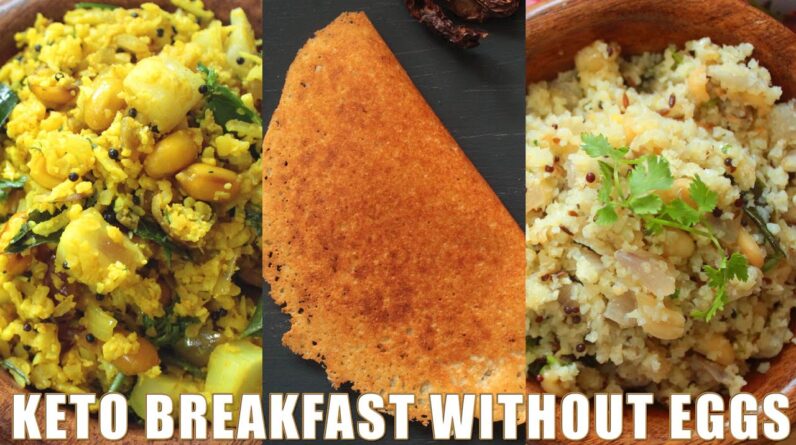Starting Keto? Here’s What You Need to Know
Everything You Need to Know About Keto – Thomas DeLauer
What is the keto diet?
A sustainable and enjoyable high-fat, moderate-protein, and low-carb (ratio: 75:20:5) eating lifestyle is established on evolutionary logic that is supported by the most strict scientific literature.
What are ketones?
Before we talk about the keto diet and weight loss, which is why you’re possibly watching this video, first, we want to give you the scientific background you need to understand the state of ketosis.
Ketones, or ketone bodies, referrs to three simple molecules: β-hydroxybutyrate (βHB), acetoacetate, and acetone. βHB is the central human ketone found in the blood. Ketones are often associated with the “4th macronutrient” because, like carbohydrates, fats, and proteins, they can be broken down by the body and used as fuel.
However, unlike carbs, fats, and proteins, they are not found in natural foods but are produced by our livers from our dietary fat or body fat.
Why do we need ketones?
The human brains have big appetites (weighing 2-3 pounds but consuming roughly 500 kCal, or about 20-25% of our daily caloric per day) and are fed by glucose. However, glucose was not always available in our diets during human evolution. So, instead of eating up all of our lean body tissue and turning muscle protein into glucose with which to feed our brains’ energy demands, the body evolved its ability to make an alternative brain fuel from our body fat, known as ketones! Without ketones as alternative fuel, we wouldn’t have survived evolution. The good news is that ketones can also fuel other body organs, like our skeletal muscles and hearts.
How does the keto diet lead to healthy weight loss?
There is no better tool to lose weight and sustain weight loss than the keto diet. This is mainly because limiting carbohydrates forces your body to learn to use your fat as fuel and reduce levels of the hormone insulin, which is your primary fat-storage hormone.
Forsythe C. et al. Lipids 2008, https://www.ncbi.nlm.nih.gov/pubmed/18046594
In addition, to teaching your body to use fat as fuel and lowering insulin, new complementary evidence from Harvard displays that low-carb diets can also change your metabolism to boost energy expenditure.
Ebbling C. et al. British Medical Journal 2018, https://www.bmj.com/content/bmj/363/bmj.k4583.full.pdf
Is the ketogenic diet hard?
This is an unfortunate misconception. The short answer is “NO.” Although it does take time to learn what works best for your body, once you have it down, the keto diet can be one of the most enjoyable and sustainable ways of living in the world.
Athinarayanan S. et al. Frontiers in Endocrinology 2019, https://www.frontiersin.org/articles/10.3389/fendo.2019.00348/full
A keto diet is one of the most effective means for treating and preventing a wide array of many chronic diseases:
Diabetes
As recently as 50 years ago, type 2 diabetes was greatly rare. Now, worldwide, the population with diabetes is rising rapidly and is heading at around 500 million.
This is a worldwide epidemic.
In the past, type 2 diabetes was considered a progressive disease with no hope for remission or reversal. People were taught to “manage” type 2 diabetes rather than reverse the underlying causes.
However, now people with type 2 diabetes can hope to recover their health! Today we know that the two main hallmarks of type 2 diabetes — high blood sugar and high insulin — can be reversed with a very low-carb diet and severe caloric restriction.
People don’t just have a big chance to “manage” their diabetes as it progresses, but they can ll to lower their blood sugar to normal levels with diet alone and avoid or discontinue most medications.
Research demonstrates that low-carb diets are a safe and effective option for handling type 2 diabetes. This body of evidence contains systematic reviews and meta-analyses of randomized controlled trials.
A meta-analysis from 2017 discovered that low-carb diets decreased the need for diabetes medication and better certain bio-markers in people with type 2 diabetes. This included a decrease in hemoglobin A1c (HbA1c), triglycerides, and blood pressure; and increases in high-density lipoprotein (HDL) cholesterol, sometimes called the “good” cholesterol.
European Journal of Clinical Nutrition 2017: The interpretation and impact of a low-carbohydrate diet in the management of type 2 diabetes: a systematic review and meta-analysis of randomized controlled trials
Heart disease
A review in the May 2017 issue of the journal Nutrients explored the effects of keto diet on the heart by looking at both rodent and human studies. In humans, research has revealed that total cholesterol, triglycerides, and LDL (“bad”) cholesterol often go down on keto, while protective HDL (“good”) cholesterol may raise. Blood sugar and HbA1C also tend to drop, possibly offering protection against develop of prediabetes and type 2 diabetes.
Another study issued in May 2018 in Cardiovascular Diabetology explored individuals with type 2 diabetes. One group obtained standard care, while another was driven by nutritional recommendations to get into ketosis. They received professional guidance for mitigating keto side effects, which could make the experience unpleasant. One year later, while the usual-care group had no changes, those in the ketosis group benefited from reduced cardiovascular risk factors, including decreases in triglycerides, blood pressure, and inflammation, and improved lipid profiles.
Cancer
Poff A. et al. International Journal of Cancer 2014, https://www.ncbi.nlm.nih.gov/pmc/articles/PMC4235292/ show that mice given ketones (the 1,3-butanediol and ketone ester groups are both ketone groups) exhibit a more significant decrease in cancer mass (bioluminescent signal) than either the caloric restriction or control mice.
Epilepsy and Alzheimer disease
This is a case report of a 63-year-old man with Alzheimer’s disease. When he was put on a keto diet, he showed a rapid improvement in mood, social ability, and memory. He also demonstrated significant improvements on cognitive tests, and his neurodegeneration stopped progressing.
Newport M. et al. Alzheimer’s and Dementia 2015, https://www.ncbi.nlm.nih.gov/pmc/articles/PMC4300286/
How to Start Keto diet
There are ways to start the keto diet safely and try it for a short time. Here are 10 tips to get you started:
Research well. It’s important first to inform yourself of the diet’s fundamental principles and figure out which foods are considered low carbohydrate and high fat. That list includes meats, low-carb vegetables, fish, and healthy oils. The keto diet eliminates refined grains, baked goods, most fruits, starchy vegetables like potatoes and corn, yogurt, beans, pasta, legumes, bread, and sweetened beverages.
Strategize. Once you are familiar with foods, you can eat in the keto lifestyle, and you can begin creating a plan, deciding what foods you can purchase at the supermarket or eat out at restaurants. Yes, you can eat at restaurants while following the keto diet, but it will require researching the menu to find keto-friendly foods that fit into a keto lifestyle.
Start slow. Consider easing into the keto diet by gradually decreasing your carbs consumption. Start with one carb-free meal a day, then two, and so on, until you can make it through an entire day.
Plan meals ahead. Always have a plan of what you will eat, by planning meals and snacks at least a day in advance, but the most successful option is to have a meal plan for the entire week,” Smith says.
Think long-term. You should choose a version of the keto diet you can keep for a longer period of time. The Atkins diet, for example, is similar to keto, but it’s a bit less strict and gives you more food options.
Buy the right foods. Make sure you keep your kitchen supplied with nutrient-dense, low-carb foods. Find foods that are part of the keto diet that excite you, and make a list of these foods.
Look at the big picture. Consider a keto diet as one part of a general lifestyle switch. Successful weight loss must also involve more physical activity, proper sleep, stress, and along with the perfect diet.
Don’t focus only on carbohydrate counting. It’s crucial to ensure you still have a well-balanced diet. Searching for the help of a registered dietitian nutritionist may be helpful to get started.
Focus on the quality of the fat you get. Choose foods containing unsaturated fats with heart health and anti-inflammatory benefits such as fatty fish, olive oil, avocado, butter, or flaxseed.
Don’t scrimp on the vegetables. Many people (on a keto diet) tend not to consume enough vegetables with the fake assumption that they all have a tremendous amount of carbs. Roasted vegetables like zucchini, cauliflower, asparagus, broccoli, and Brussels sprouts, make perfect side dishes if you’re on the keto diet.
Starting Keto; Final Words
A keto diet has been shown to offer numerous benefits, such as weight loss, reversal of type 2 diabetes, and improved metabolic health. Despite that, results may differ from person to person. Focus on your own keto journey.









